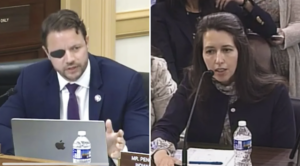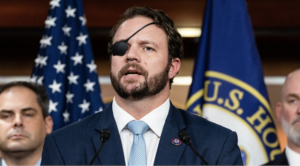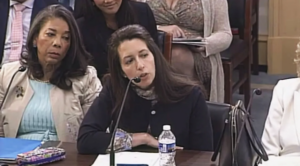Texas Republican Dan Crenshaw ripped into a Democrat Wednesday for her inability to cite a study that outlines the benefits of minors undergoing transgender surgery.
Crenshaw made his comments during a hearing of the House Committee on Energy and Commerce, when he asked Meredithe McNamara, assistant professor at Yale School of Medicine, about his plan to remove funding from hospitals that offer surgeries or puberty-blocking hormones for transgender minors.
You said we cherry-picked the data. What do you mean by that? Crenshaw asked McNamara.
She responded, “It is unscientific to discuss a single study in isolation or a statistic.” Medical experts can discuss all the evidence in a broader context.

McNamara was told by the Texas congressman that he “totally agrees”. It’s important to consider systematic reviews, yes? This is the gold standard for evidence to determine whether or not something works. The British Journal of Medicine examined 61 systematic reviews and concluded that there is “great uncertainty” about the effects of cross-sex hormonal treatments, puberty blockers, and surgeries on young people. The Journal of the Endocrine Society also came to the same conclusion. “They all cite a lack of evidence.”
He continued, “If it’s temporary, then fine. Let’s see if we can try it out and see if the therapy works.” Do you agree that, from an ethical perspective, you would want to see very strong evidence for the benefits when talking about permanent changes in your body? No systematic review has ever stated that there is strong evidence for benefits.
“Sir, are you familiar with the way in which quality evidence is graded and how that system is applied?” McNamara shot back.
Crenshaw told McNamara he had “read it” with his team and that this was the reason he “cited these journals.”
Which journal is saying something else? This debate is important. “Tell me a journal that has conducted systematic reviews and cited different evidence. Cite strong evidence for the benefits of these therapies,” said he.

McNamara replied, “The standards were developed on the basis of extensive research–”
Crenshaw interrupted, “You are not telling me about any study. Don’t use the term standards for care.” “Tell me a study.”
McNamara replied, “So, umm, the standards of health care.”
Crenshaw asked, “What are the standards of care?” “That’s neither a journal nor a study. This is not an organization. This is not an organization. You are just using words. “Name one study.”
McNamara did not name a study before Crenshaw’s term expired.

Crenshaw’s Office noted in an earlier report that the Children’s Hospital GME Support Reauthorization Act must be reauthorized at least every five years. The bill provides funding to train pediatric residents in 59 hospitals across the country. In the past, this bill has been responsible for training almost half of all general pediatric residents in the United States.
Crenshaw presented the legislation this year with the stipulation of preventing funding from going to hospitals for minors that provide “gender-affirming” care.
Crenshaw, who introduced the legislation, said that “there is no other American human rights atrocity that has gained such momentum and is being validated by the institutions that should be aware of better.” Children’s hospitals are one of these institutions. There is no reason to perform treatments that alter the physiology of a child permanently in a place like this, where ‘doing no harm’ is a guiding principle. We will no longer allow any of the taxpayer-funded funds to be used to fund children’s hospitals that practice harmful pseudoscience, such as ‘gender-affirming’ care.




